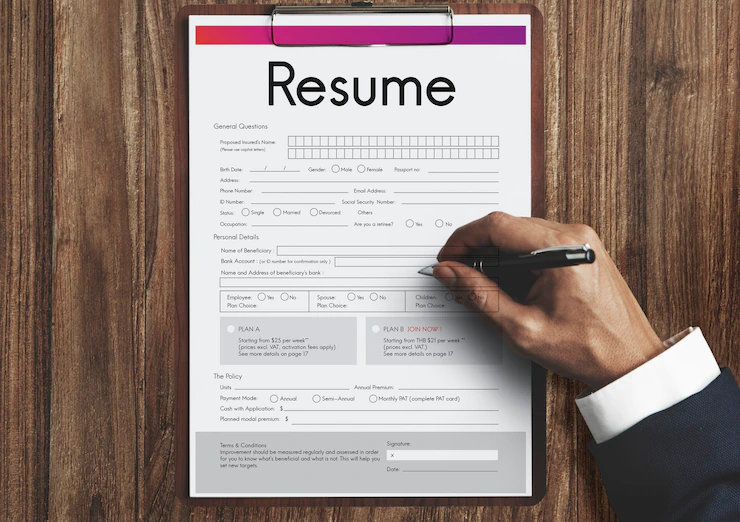
Words to Use and to Avoid in Your Resume
Your resume is your first chance to make a positive impression on potential employers. Choose your words carefully to ensure your resume stands out from the competition. Strong action verbs and adjectives can effectively showcase your skills and accomplishments, catching the employer's attention and increasing your chances of getting an interview. This article details tips on identifying and using these powerful words in your resume and provides examples to help you craft an outstanding resume.

Why Are Strong Action Verbs and Adjectives Important?
Understanding the significance of strong action verbs and adjectives in your resume is essential. These adjectives for resume are not just decorative fluff; they carry the potential to portray you as a proactive and capable individual with a myriad of skills and achievements.
Consider the following example:
Weak: "Responsible for managing a team of sales representatives."
Strong: "Led a high-performing team of sales representatives, driving a 20% increase in monthly revenue."
In the strong version, we replaced the generic "responsible for" with "led," which conveys a sense of authority and accomplishment. These are the resume words to use that showcase your capabilities in a way that engages the reader and makes a lasting impression.
Tips on Identifying and Using Strong Action Verbs and Adjectives
One of the most powerful tools when crafting a resume is strategically using strong action verbs and adjectives. These dynamic words can add a punch to your resume, instantly grabbing the attention of hiring managers and making your accomplishments and qualifications shine. The following are tips on identifying and effectively using these potent words to create a compelling and impressive resume.
Identify and Utilize Relevant Action Verbs
Begin by assessing your past experiences and accomplishments. Look for strong action verbs that precisely describe what you achieved in your previous roles. Some powerful action verbs to consider include:
- Achieved: Demonstrates successful results and tangible outcomes.
- Implemented: Shows that you put plans into action.
- Revamped: Indicates your ability to improve and modernize processes or systems.
- Collaborated: Illustrates teamwork and the ability to work effectively with others.
- Exceeded: Highlights your ability to surpass targets or expectations.
The key is to choose verbs that accurately depict your contributions and the impact you made. Avoid using overused or clichéd words that can water down your message.
Utilize Impactful Adjectives
Incorporating strong adjectives into your resume can elevate your achievements and skills to a whole new level. Adjectives allow you to paint a vivid picture of your abilities and characteristics. Here are some impactful adjectives to consider:
- Dynamic: Emphasizes your energetic and enthusiastic approach.
- Innovative: Highlights your creativity and ability to think outside the box.
- Exceptional: Indicates outstanding performance and skills.
- Strategic: Suggests your ability to plan and execute with a long-term vision.
- Efficient: Demonstrates your capability to achieve results promptly.
Use adjectives that genuinely reflect your qualities and align with the job you're applying for. It's important not to exaggerate or use overly flowery language, as it may appear insincere.
Tailor Your Language to the Job Description
Every job posting comes with a list of desired qualifications and responsibilities. Tailoring your resume to each job is crucial, including your choice of action verbs and adjectives. Use keywords from the job description to directly connect your skills and the position's requirements. For example, if the job description mentions "project management" as a key responsibility, consider using verbs like "orchestrated," "coordinated," or "executed" to highlight your project management experience.
Quantify Your Achievements
Numbers speak louder than words. Whenever possible, quantify your accomplishments to add credibility to your resume. Use strong action verbs alongside specific metrics to showcase the impact you've made in your previous roles.
Weak: "Improved sales performance significantly."
Strong: "Boosted sales performance by 35% within the first quarter." Adding quantifiable results makes your achievements more tangible and impressive.
Examples of Specific Words to Make Your Resume Stand Out
a. Strong Action Verbs:
- Achieved
- Implemented
- Revamped
- Streamlined
- Resolved
- Executed
- Generated
- Spearheaded
- Negotiated
- Collaborated
b. Impressive adjectives for resumes:
- Accomplished
- Proficient
- Innovative
- Resourceful
- Diligent
- Versatile
- Pioneering
- Tenacious
- Influential
- Adaptable
Words to Avoid on Resume
While strong words can elevate your resume, certain words can detract from its impact. Weak or overused words can make your application sound generic and unremarkable. Avoiding such terms can help ensure that your resume reflects your true potential. Below are tips on identifying and removing these words and provide examples to guide you in creating a compelling resume.
Tips on Identifying and Removing Weak or Overused Words:
Recognize Weak Words
Weak words are vague and lack specificity, making your resume less compelling. Some common examples of weak words include:
- Responsible for: This phrase is often overused and doesn't highlight your achievements or contributions.
- Assisted: "Assisted" implies a secondary or supportive position instead of showing your active role.
- Assisted: "Assisted" implies a secondary or supportive position instead of showing your active role.
- Good: "Good" is subjective and doesn't provide a clear picture of your skills or accomplishments.
- Handled: This word doesn't convey the level of expertise or proficiency in managing tasks.
Replace Weak Words with Strong Action Verbs
Identify weak words in your resume and replace them with strong action verbs that vividly demonstrate your skills and accomplishments. Strong action verbs can energize your resume and paint a picture of your capabilities. Here are some examples of powerful action verbs:
- Managed: Illustrates leadership and control over tasks or projects.
- Implemented: Demonstrates your ability to put ideas or plans into action.
- Achieved: Shows successful results and concrete accomplishments.
- Revitalized: Highlights your capacity to rejuvenate or improve processes.
- Maximized: Suggests your ability to make the most of opportunities or resources.
Remember to choose action verbs relevant to your experiences and align with the job description you're applying for.
Trim Unnecessary Adjectives and Adverbs
While adjectives and adverbs can add color to your resume, using too many can clutter the document and weaken its impact. Instead of relying on generic adjectives and adverbs, focus on strong nouns and action verbs to convey your achievements.
- Weak: "Extremely successful sales manager with a very high sales record."
- Improved: "Top-performing sales manager with a record-breaking sales performance."
In the improved version, we eliminated unnecessary adjectives and adverbs and replaced them with specific nouns and impactful action verbs.
Use Synonyms to Diversify Your Vocabulary
Don't repeat the same words throughout your resume. Utilize assisted synonym resume to add variety and depth to your language. A thesaurus can be a helpful tool for finding alternative words with similar meanings.
Examples of Words and Phrases to Avoid
- Hardworking
- Detail-oriented
- Results-driven
- Responsible for
- Assisted with
- Good at
- Skilled in
- Reliable
- Excellent
- Successful
Industry Language and Why It Is Important to Use It
Industry language, or jargon or terminology, refers to the specialized vocabulary and expressions used within a particular profession or field. Every industry has unique terms, acronyms, and phrases familiar to those within it. This language allows professionals to communicate more efficiently and precisely about specific concepts and processes related to their work.
Why Does Industry Language Matter? Using industry language in your resume can offer several significant advantages:
Demonstrates Industry Knowledge
Employers are looking for candidates who possess a deep understanding of their field. By incorporating relevant industry language, you show that you are familiar with the intricacies and nuances of the profession, making you a more attractive candidate.
Enhances Credibility
The use of industry language can add credibility to your resume. It signals to hiring managers that you have practical experience and are well-versed in the key aspects of the industry.
Connects with Hiring Managers
Recruiters and hiring managers often have a background in the industry they're hiring for. When they encounter industry-specific terms in your resume, it creates an immediate connection and understanding, making them more likely to consider you for the position.
Highlights Relevant Experience
Using industry language allows you to describe your past roles and achievements more accurately. It enables you to emphasize your experience in a way that directly relates to the job requirements, making it easier for hiring managers to see your suitability for the role.
Adaptation of Words to the Job Description
Employers are looking for candidates who fit the role perfectly, and one way to demonstrate this is by incorporating keywords and phrases from the job description into your resume. Here's how to do it effectively:
Research the Industry Keywords. Begin by researching the specific keywords and phrases commonly used in your industry. Pay attention to job descriptions, industry publications, and professional websites. Make a list of these terms and prioritize the ones most relevant to your skills and experience.
Tailor Your Language to the Job Posting. Each job posting may have its own set of preferred industry languages. Tailor your resume for each application by incorporating the relevant keywords from the job description. This demonstrates your familiarity with the industry and helps your resume pass through applicant tracking systems (ATS) that scan for specific keywords.
Use Action Verbs Specific to Your Field. In addition to industry terms, incorporate action verbs commonly used in your profession. For example, if you're in project management, use verbs like "coordinated," "executed," or "implemented" to showcase your skills effectively.
Showcase Achievements with Industry Language. Use industry language to highlight your impact when describing your achievements and accomplishments. This will make your contributions more meaningful and relevant to potential employers.
Be Mindful of Your Audience. While using industry language is crucial, remember who will read your resume. If you're applying for a job outside your current industry or to a company where industry-specific terms may not be well-known, balance using the appropriate language and ensuring clarity and understanding for all readers.
Customizing Your Summary or Objective. The top section of your resume, the summary or objective, is ideal for tailoring your words to the job description. Use this space to craft a compelling statement showcasing your most relevant skills and experience. Address the employer's needs directly and highlight how your strengths align with the position. Generic: "Highly motivated professional seeking a challenging role in a dynamic company." Tailored: "Results-driven marketing specialist with a proven track record in driving brand awareness and customer engagement, seeking an opportunity to lead digital marketing initiatives at a forward-thinking tech startup."
Understand the Power of Tailoring. Sending the same generic resume to multiple job openings is a common mistake many job seekers make. Each job posting has unique requirements, responsibilities, and company cultures. A tailored resume, on the other hand, is a personalized document that addresses the specific needs and preferences of the employer. By showing that you've taken the time to customize your application, you demonstrate your enthusiasm and dedication to the role.
Key Conclusions
Crafting an impressive resume requires careful consideration of good descriptive words for resume. Strong action verbs and adjectives can elevate your application, while weak or overused words can diminish its impact. Incorporating industry-specific language, good resume words, and tailoring your resume to the job description further enhance your chances of success. Following these tips and examples, you can create a standout resume showcasing your skills, accomplishments, and potential to prospective employers.
Frequently Asked Questions and Answers
Q1: What examples of strong action verbs and adjectives should be used in a resume?
Some examples of strong action verbs are "achieved," "implemented," "revamped," "streamlined," and "negotiated." Strong adjectives include "accomplished," "innovative," "resourceful," "diligent," and "influential."
Q2: How can I identify and eliminate weak or overused words in my resume?
Carefully review your resume and look for vague, clichéd, or repetitive terms. Replace them with more specific, impactful words demonstrating your achievements and capabilities.
Q3: Why is using industry-specific language in a resume important, and how do I incorporate it effectively?
Using industry-specific language shows your knowledge and relevance to the field, increasing your credibility with potential employers. Incorporate industry terms naturally by aligning your skills and experiences with the job requirements.
Q4: How do I tailor my resume to the job description and incorporate keywords and phrases?
Identify keywords from the job description and incorporate them strategically throughout your resume, especially in the summary, skills, and experience sections. Provide examples that demonstrate how your skills match the requirements.
Q5: What are some tips for avoiding gender bias in my resume's word choices and phrasing?
To avoid gender bias, use gender-neutral language whenever possible. For example, instead of "salesman," use "sales representative" or "sales professional." Focus on skills and accomplishments rather than gender-specific pronouns when describing experiences.
Related articles:
-
Where Do Keywords Lead You To?
-
Top Resume writing and career development tips
-
How Do CVs Differ From Resumes?
-
Should You Pay Someone To Write Your Resume/CV?
-
10 Tough Nursing Interview Questions
-
Reasons to Send Follow-Up and Thank-You Letters?
-
When to Send a Thank You Letter After Interview?
-
10 Points can be Deleted from the Professional Resume
-
4 Resume Tips that Help to Get the CEO Job
-
5 Elements for an Effective Project Manager Resume
-
7 Tips on How to Make a Video Resume
-
9 ways to enhance your blank resume and get the first job
-
Accountant Resume Tips
-
Ultimate Guide on How to Create a Winning Resume
-
Soft Skills List to Make an Outstanding Resume
-
Engineering Resume Writing Tips
